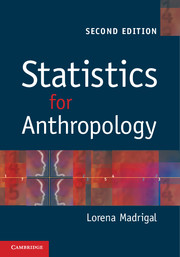Book contents
- Frontmatter
- Contents
- List of partial statistical tables
- Preface
- 1 Introduction to statistics and simple descriptive statistics
- 2 The first step in data analysis
- 3 Probability and statistics
- 4 Hypothesis testing and estimation
- 5 The difference between two means
- 6 The analysis of variance (ANOVA)
- 7 Non-parametric tests for the comparison of samples
- 8 The analysis of frequencies
- 9 Correlation analysis
- 10 Simple linear regression
- 11 Advanced topics in regression analysis
- References
- Index
4 - Hypothesis testing and estimation
Published online by Cambridge University Press: 05 June 2012
- Frontmatter
- Contents
- List of partial statistical tables
- Preface
- 1 Introduction to statistics and simple descriptive statistics
- 2 The first step in data analysis
- 3 Probability and statistics
- 4 Hypothesis testing and estimation
- 5 The difference between two means
- 6 The analysis of variance (ANOVA)
- 7 Non-parametric tests for the comparison of samples
- 8 The analysis of frequencies
- 9 Correlation analysis
- 10 Simple linear regression
- 11 Advanced topics in regression analysis
- References
- Index
Summary
Different approaches to hypothesis testing and estimation
Anthropologists have dealt numerous times with a situation in which a cultural manifestation achieves hegemony over others. For example, in many countries bio-medicine achieved the status of acceptable medicine while pushing other forms of medical care out to the fringes. In several historical cases a language became the lingua franca while displacing others. In the world of statistical analysis of quantitative data, the usual process of hypothesis testing which results in most of the hundreds of papers published in scientific journals is also a result of the hegemony of an ideology over others. It was not always done as it is today although most statistics textbooks (the first edition of this book included) do not acknowledge it.
In this chapter we cover two related topics: estimation and hypothesis testing, although the majority of the chapter concentrates on the latter. A good statistical background is necessary for an anthropological scientist because the mark of science is its ability to test and reject hypotheses. Hypothesis testing is at the core of what science does, and statistical analysis is a tool to accomplish it.
- Type
- Chapter
- Information
- Statistics for Anthropology , pp. 83 - 107Publisher: Cambridge University PressPrint publication year: 2012

